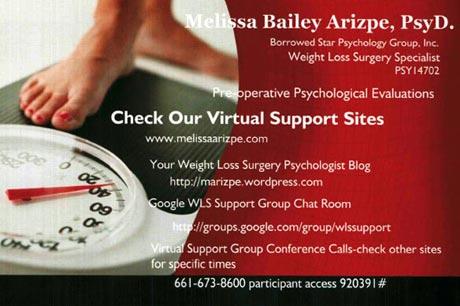Support after Surgery
We understand ongoing support is crucial during your weight loss process. Our licensed clinical psychologist performs pre-operative psychological evaluations for BHP patients. Additionally, post surgery resources are available for all BHP patients. A blog, website and chat room are available for 24 hour support. Patients also have access to a “virtual” support group one time a month via conference call. The reason we encourage the virtual support group is because we understand patients have busy lives and many live a far distance. We want to make support as accessible as possible. If you prefer an in person support group let your surgery consultant or Psychologist know.
Topics covered online and during support groups include emotional eating, mindful eating, coping skills, dealing with head hunger, and making behavior changes.

Weight Loss Surgery and the Emotional Impact Q&A
Why do I have to have a psychological evaluation prior to surgery?
The psychological evaluation is part of the process to prepare you for surgery. It helps the surgical team find out if there are areas that you might need additional support as you go through the surgery process. Most insurance companies require it in order to approve the surgery. Also, facilities that have been deemed “Centers of Excellence” by the American Society of Bariatric Surgeons also require it.
What are some of the emotional changes I can expect after surgery?
Surgery is the first step in a new journey. As you start to lose weight you may notice that people look at you different. This may feel uncomfortable. Although surgery is a positive thing, sometimes patients get a little depressed or frustrated after surgery because they didn’t realize just how much you have to watch what you eat. If you used food as a way to deal with stress, it may be difficult to find new ways to manage stress after surgery.
How important is support after surgery?
Support is extremely important. Studies indicate that patients who utilize the support that is offered by the various programs or attend support groups are more successful after surgery. Utilize the support offered. Make sure you maximize your follow-up appointments with your surgeon. Ask questions. Ask to see the psychologist or the nutritionist. If you start to have some depression, emotional difficulties or are feeling overwhelmed, make sure you connect with someone. Often times all it takes to get back on track is a one-time meeting with the surgeon, nutritionist or psychologist.
Use online resources such as your surgeons own web resources or look into the following:
Are there any books out there that can help me?
Absolutely! The best one on dealing with the emotions that go along with surgery is The Emotional First Aid Kit: A Practical Guide to Life After Bariatric Surgery by Cynthia Alexander, Psy.D.
Eating Well After Weight Loss Surgery: Over 140 Delicious Low-Fat High-Protein Recipes to Enjoy in the Weeks, Months and Years After Surgery by Patt Levine, Michele Bontmpo-Saray, William B. Inabnet, and Meredith Urban-Skuros.
The Success Habits of Weight-Loss Surgery Patients by Colleen M. Cook.
Before & After, Revised Edition: Living and Eating Well After Weight-Loss Surgery by Susan Maria Leach.
Weight Loss Surgery with the Adjustable Gastric Band: Everything You Need to Know Before and After Surgery to Lose Weight Successfully by Robert Sewell M.D. and Linda Rohrbough.
